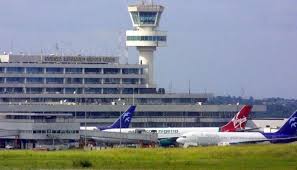- Experts To Discuss Infrastructural Growth At Transport Summit
- Ex-Virgin Nigeria Staff, Reminisce, Unite To Chart Strategic Aviation Future
- IATA: Europe, largest int’l market for passenger flow from Nigeria, aviation contributes $2.5b to nation's GDP
- States stuck in rat race for own airlines
- Air Peace takes delivery of second regional Embraer190 aircraft
IATA: Europe, largest int’l market for passenger flow from Nigeria, aviation contributes $2.5b to nation’s GDP

- 195,700 tonnes of cargo transported through Nigeria in 2023
- Tourism contributes $454.1 million to GDP and employs 66,600 people
The International Air Transport Association (IATA) has weighed in on Nigeria’s aviation industry, disclosing that Europe is the largest international market for passenger flows from Nigeria, followed by Africa and North America.
It further revealed that international air traffic accounted for 23% of total origin-destination (O-D) departures for Nigeria in 2023, equivalent to 2.1 million passenger departures.
This sector, according to it, directly employs 39,500 people, contributing $2.5 billion, which represents 0.2% of the nation’s Gross Domestic Product (GDP).
This comes as the clearing house for over 300 global airlines stated that 195,700 tonnes of air cargo were transported through airports in Nigeria in 2023, supporting the country’s total import and export volumes. The statement also noted that in times of crisis, the world relies on air cargo to provide humanitarian aid and emergency relief.

According to IATA statistics, almost 780,700 passengers departed from Nigeria to a country in Europe (38% of the total), 485,400 to another country in Africa (23% of the total), and 373,000 to North America (18% of the total).
Regional Vice President for Africa and the Middle East, Kamil Alawadhi, said, “Aviation is a powerful engine for economic and social development. Nigeria’s National Day is a good opportunity to reflect on the immense value aviation brings to the country.”
“Air transport supports over 217,000 jobs and contributes $2.5 billion to Nigeria’s GDP. With one of the fastest-growing populations in Africa and the world, and a predominantly young demographic, there is immense opportunity for future economic growth”, he added.
The IATA chief explained that there are different ways of measuring air transport’s impact on an economy.
Two key indicators, he stated, are the number of jobs and the contribution to gross domestic product (GDP) generated by the aviation sector, including airlines, airport operators and onsite businesses, air navigation service providers (ANSPs), and manufacturers (“direct” aviation players).
Tourism supported by aviation, he noted, contributes $454.1 million to the country’s GDP and employs 66,600 people, stressing that international tourists to Nigeria are estimated to contribute $760.2 million annually to the economy through the purchase of goods and services from local businesses.
According to Alawadhi, aviation creates a range of social benefits and contributes significantly to the United Nations Sustainable Development Goals (SDGs), including using air transport to enhance access to education, connecting friends and families, facilitating cultural exchange, and driving socio-economic development.
Acting together, these forces, he reiterated, enable a country to expand its productive potential, delivering long-term economic growth and supporting the reduction in poverty and improvement in living standards for all of the nation’s citizens.
He said, “The cost of flying impacts the magnitude of the benefits that can be generated by air travel. In the past 50 years, flight costs have decreased by 70% globally, making air transport more accessible. The average real airfare in Nigeria decreased by 43%6 between 2011 and 2023, with the local population now needing to work 37.6 days to afford a plane ticket. Overall, 40 flights per 1,000 population were taken in 2023.”

“Aviation stimulates global trade and investment, enables labour and capital productivity improvements, boosts innovation, and fosters knowledge exchange. The movement of goods, enabled by the air transport industry, brings about improved economic outcomes via catalytic collaboration, specialisation, and more efficient allocation of resources across all sectors of the local and world economy.”
Google+



%u
I think this is among the most important information for me. And i’m glad reading your article. But should remark on some general things, The website style is ideal, the articles is really nice : D. Good job, cheershttp://toolbarqueries.google.com.bh/url?q=http%3A%2F%2Fnanjangcultures.egreef.kr%2Fbbs%2Fboard.php%3Fbo_table%3D02_04%26wr_id%3D284570
Here is my page best ecommerce selling platforms 2026
%%
Wow lots of helpful tips.
http://old.roxen.ru/bitrix/redirect.php?goto=https://ste-http://old.roxen.ru/bitrix/redirect.php?goto=https://ste-b2b.agency/.agency/